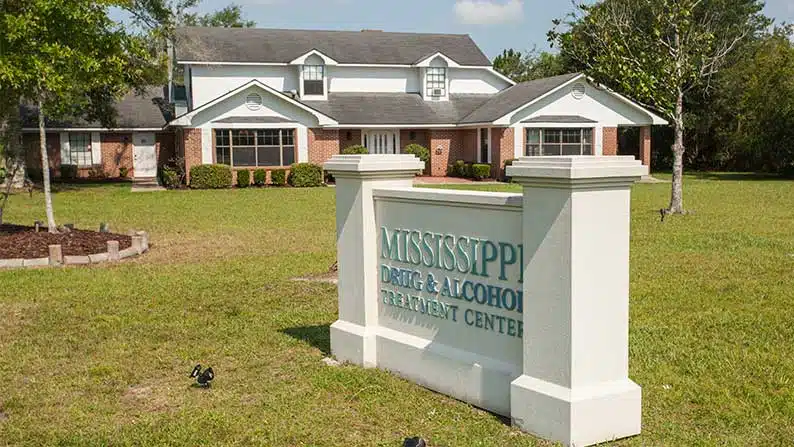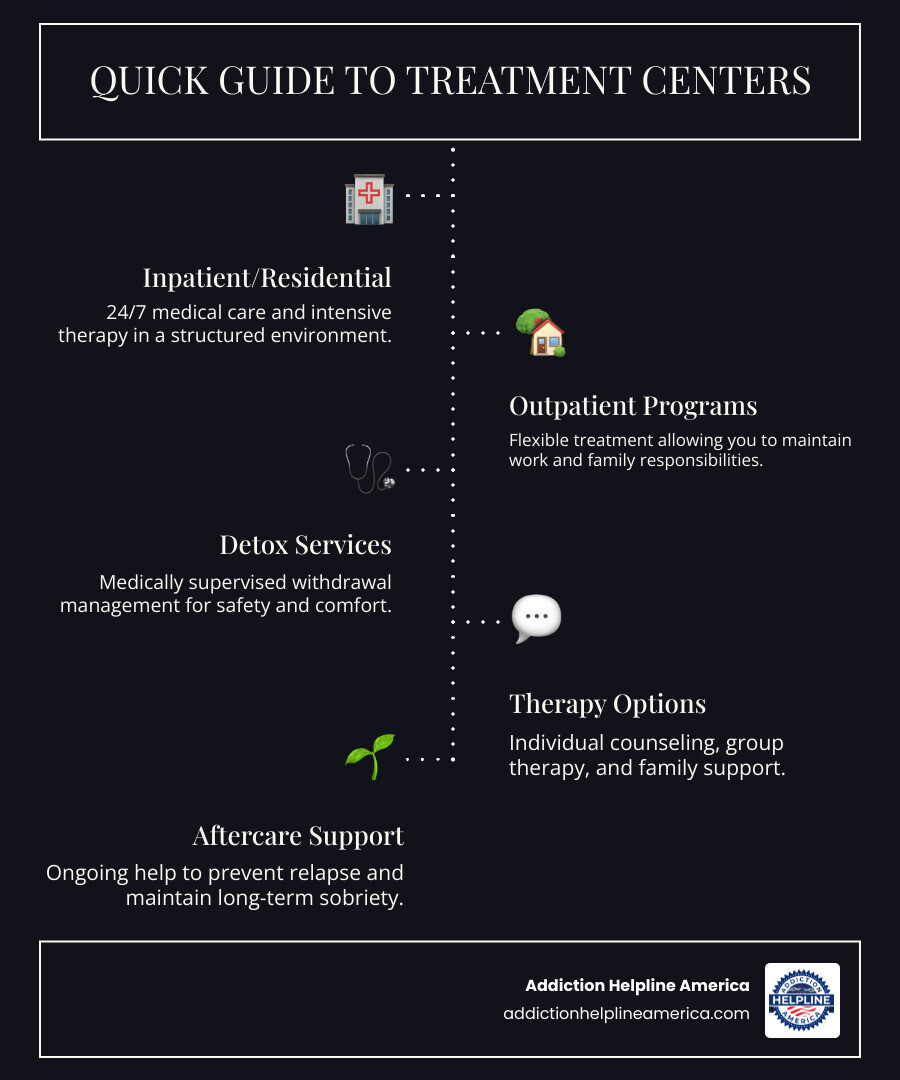
Why Finding the Right Alcoholism Treatment Center Can Save Your Life
Alcoholism treatment centers provide professional, evidence-based care for individuals struggling with alcohol addiction. If you’re searching for help, this guide will cover what you need to know.
Quick Guide to Alcoholism Treatment Centers:
- Inpatient/Residential Programs – 24/7 medical care and intensive therapy in a structured environment
- Outpatient Programs – Flexible treatment that allows you to maintain work and family responsibilities
- Detox Services – Medically supervised withdrawal management for safety and comfort
- Therapy Options – Individual counseling, group therapy, and family support
- Aftercare Support – Ongoing help to prevent relapse and maintain sobriety
What to Look For:
- Accreditation and state licensing
- Qualified medical staff and addiction specialists
- Evidence-based treatment approaches (CBT, DBT, holistic care)
- Insurance acceptance or affordable payment options
- Treatment for co-occurring mental health disorders
Recovery is possible, and the right alcoholism treatment center can make all the difference.
Alcohol Use Disorder (AUD) is a chronic medical condition where one cannot control their drinking despite harmful consequences. The good news? Treatment works. With professional care, recovery is happening every day.
Finding the right treatment center can feel overwhelming. You may have questions about program types, costs, insurance, and detox. We’re here to help you find answers.
At Addiction Helpline America, we connect individuals and families with quality alcoholism treatment centers nationwide. We provide free, confidential, 24/7 support to help you find the right treatment for your unique situation.
This guide will walk you through understanding alcohol addiction, comparing treatment types, choosing a quality facility, and taking the first step toward healing.

Alcoholism treatment centers terminology:
- how much do alcohol treatment centers cost
- alcohol treatment centers that accept aetna
- support for alcoholics
Understanding Alcohol Use Disorder and Why Treatment is Crucial
Before finding the right help, it’s important to understand what you’re dealing with—and why reaching out to alcoholism treatment centers can be life-changing.
What is Alcoholism or AUD?
Alcoholism, clinically known as Alcohol Use Disorder (AUD), is a medical condition, not a lack of willpower. It’s a chronic brain disease that makes it extremely difficult to control drinking, even when it causes serious problems.
AUD exists on a spectrum from mild to severe. The common thread is a pattern of uncontrolled drinking that harms one’s health, work, or home life. Key signs include needing more alcohol for the same effect (tolerance) and feeling sick when trying to stop (withdrawal).
The National Institute on Alcohol Abuse and Alcoholism confirms that AUD is a treatable medical condition. At Addiction Helpline America, we’ve seen thousands turn their lives around by recognizing this is a health issue, not a character flaw.
Recognizing the Signs and Symptoms
If several of the following experiences from the past year seem familiar, it may be time to seek help.
- Increased tolerance: Needing more alcohol to achieve the desired effect.
- Withdrawal symptoms: Feeling shaky, anxious, sweaty, or sick when you haven’t had a drink. These can be dangerous, making medical supervision crucial.
- Neglecting responsibilities: Missing work, school, or family obligations because of drinking.
- Failed attempts to quit: Promising to cut back or stop but being unable to stick with it. This is a symptom of the disease, not a personal failure.
- Cravings: Experiencing intense, overwhelming urges to drink.
- Continued use despite problems: Knowing that drinking is hurting your health, relationships, or job, but being unable to stop.
Recognizing these patterns is the first step toward getting the right help. For more information on substance use disorders, see our Drug Addiction Complete Guide. If these symptoms resonate, professional support from alcoholism treatment centers can make all the difference.
Comparing Alcohol Treatment Programs: What’s Right for You?
Choosing the right alcoholism treatment center is easier when you understand your options. There’s no single “best” program—only what works for your unique needs, circumstances, and the severity of your alcohol use. Treatment programs range from 24/7 residential care to flexible sessions from home. Let’s break down the main types.
Inpatient vs. Outpatient vs. Telehealth
The three main types of alcohol treatment differ in intensity, structure, and daily life integration.
| Feature | Inpatient (Residential) Programs | Outpatient Programs | Telehealth Programs |
|---|---|---|---|
| Intensity | Highest intensity, 24/7 care and supervision | Varies from Partial Hospitalization (PHP) to Intensive Outpatient (IOP) to standard outpatient | Moderate to high intensity, delivered remotely |
| Structure | Highly structured daily schedule, living at the facility | Structured sessions several times a week, living at home | Flexible scheduling of remote sessions |
| Cost | Generally highest due to round-the-clock care and accommodation | Lower than inpatient, varies by intensity | Often most affordable, saves on travel and accommodation |
| Ideal Candidate | Severe AUD, unstable home environment, co-occurring disorders, need for medical detox | Moderate AUD, stable home, strong support system, work/family commitments | Moderate AUD, geographical barriers, need for flexibility, privacy concerns |
Inpatient or residential programs offer the most comprehensive, 24/7 care. You live at the facility, typically for 30 days or more, removed from daily triggers to focus entirely on healing. This is ideal for severe AUD, those needing medical detox, or individuals with an unstable home environment. Our 30 Day Inpatient Rehab Programs guide offers more detail.
Outpatient programs allow you to live at home while attending scheduled treatment. They vary in intensity:
- Partial Hospitalization Programs (PHP) offer intensive daily treatment without an overnight stay.
- Intensive Outpatient Programs (IOP) are less time-intensive than PHP, allowing you to maintain work or family duties.
- Standard outpatient care involves weekly sessions, suitable for mild AUD or as aftercare. For local options, see our Outpatient Rehab Tulsa guide.
Telehealth programs deliver therapy and medical consultations via secure video conferencing. This is a great option if you face geographical barriers, have transportation issues, or require maximum flexibility and discretion.
Specialized Alcoholism Treatment Centers
Many alcoholism treatment centers offer programs for specific needs.
- Co-occurring disorders (dual diagnosis) treatment is for those struggling with both addiction and mental health conditions like depression or anxiety. It addresses both issues simultaneously for more effective recovery. Learn more in our Treatment for Depression and Anxiety resource.
- Luxury programs provide high-end amenities like private rooms and gourmet meals alongside evidence-based care, prioritizing comfort and privacy. See our Luxury Drug Rehab guide for more.
- Alternative approaches, such as Non 12-Step Rehab Programs, use philosophies centered on self-empowerment and cognitive techniques, offering valid recovery paths for those who don’t connect with traditional models.
The right program depends on your personal situation. Addiction Helpline America can help you sort through these options to find alcoholism treatment centers that match your needs.
Key Qualities of Effective Alcoholism Treatment Centers
Choosing the right alcoholism treatment center is a critical decision. Not all centers offer the same quality of care, so knowing what to look for is essential for success.
Accreditation and Licensing
Accreditation and licensing are your assurance of quality and safety. A state license is the minimum requirement, proving a facility meets basic health and safety standards. Always verify a center’s license is active.
The best centers also seek accreditation from independent organizations, which signifies they meet rigorous national standards for care, staffing, and treatment protocols. Similar to systems like Accreditation Canada, these credentials show a commitment to excellence.
A quality facility will have a multidisciplinary team of medical doctors, licensed therapists, and certified addiction counselors to provide comprehensive care.
Evidence-Based Therapies and Approaches

Effective treatment uses therapies proven by scientific research.
- Cognitive Behavioral Therapy (CBT) helps you identify and change negative thought patterns and behaviors that drive alcohol use, teaching practical coping skills.
- Dialectical Behavior Therapy (DBT) is effective for those with intense emotions or co-occurring conditions, focusing on emotional regulation, distress tolerance, and mindfulness.
- Group therapy builds a supportive community where you can share experiences and learn from peers, reducing the isolation of addiction.
- Individual counseling provides a private space to explore the root causes of your addiction with a therapist and create a personalized treatment plan. Our Types of Addiction Therapy guide has more details.
Many centers also use a holistic approach, incorporating activities like yoga, meditation, and art therapy to heal the mind, body, and spirit. Good nutrition is also emphasized to support physical and mental recovery.
How to Choose the Right Alcoholism Treatment Center
Finding the right fit means matching a program to your unique needs.
First, assess your situation: How severe is the AUD? Are there co-occurring mental health issues? What is your home support system like? What are your financial and insurance resources?
When contacting centers, ask key questions: What is their treatment philosophy? What therapies do they use? What is the staff-to-patient ratio? A quality center will provide clear answers.
Location and environment are also important. Some people need to get away from triggers, while others thrive with local family support. The atmosphere of the facility—whether serene, structured, or home-like—can also impact your comfort. Our guide on How to Find the Right Rehab Center can help you weigh these factors.
Program duration should be based on individual needs. While 30-day programs are common, longer stays often lead to better outcomes, especially for severe AUD. See our 6 Month Inpatient Rehab MO Guide for information on extended care.
Navigating these choices can be tough. Addiction Helpline America is here to provide personalized guidance and connect you with the right alcoholism treatment centers.
The Recovery Journey: What to Expect During and After Treatment
Recovery is a journey with distinct phases. Understanding what to expect can reduce anxiety about starting treatment.
The Role of Medical Detox
For many people beginning treatment at an alcoholism treatment center, the first hurdle is getting through withdrawal safely.

Suddenly stopping heavy, prolonged drinking can cause dangerous withdrawal symptoms like seizures, delirium tremens (DTs), and severe dehydration. Attempting to detox alone at home is not safe.
Medically supervised withdrawal provides 24/7 monitoring by healthcare professionals. They manage symptoms with medication and supportive care to keep you safe and as comfortable as possible. For moderate to severe AUD, medical detox is the safest way to begin recovery. Our Best Detoxes Near Me Guide can help you find a safe facility.
Family Involvement and Support
Addiction affects the entire family, so quality alcoholism treatment centers often include loved ones in the healing process.
Family therapy sessions help repair relationships, improve communication, and teach family members how to offer healthy support. Educational workshops explain the science of addiction, helping loved ones understand it as a medical condition, not a moral failing. A strong, educated support system at home dramatically improves the chances of long-term sobriety.
If you’re struggling to convince a loved one to accept help, our guide on Holding an Intervention offers compassionate and effective strategies.
Aftercare and Relapse Prevention
Completing a program is a major achievement, but it’s the beginning of the recovery journey. Aftercare is crucial for navigating the transition back to daily life.
- Ongoing support, like regular counseling and check-ins, provides structure during the vulnerable early months of recovery.
- Alumni programs connect you with a community of peers who have been through the same process, offering mentorship and sober social events.
- Support groups offer a safe space to share struggles and successes with others who understand.
- Sober living homes provide a structured, drug-free environment to practice new skills with accountability, bridging the gap between inpatient care and independent living.
- A personalized relapse prevention plan is your roadmap for handling triggers and cravings. It outlines your specific triggers, coping strategies, and an action plan for difficult moments.
Recovery is a lifelong process. The right aftercare plan builds the skills and resilience needed for lasting success.
Navigating Costs, Insurance, and Finding Help
Cost is a common concern when seeking help for alcohol addiction, but it shouldn’t be a barrier to recovery. More options are available than you might think.
Understanding the Cost of Rehab
The cost of alcoholism treatment centers varies based on several factors:
- Program type: Inpatient programs cost more than outpatient or telehealth due to 24/7 care, housing, and meals.
- Amenities: Luxury facilities with private rooms and spa services have a higher price tag. Our Private Addiction Treatment Guide explores these options. However, effective care is available at all price points.
- Duration: A 30-day program costs less than a 90-day stay, but longer treatment often improves long-term outcomes.
- Location: Costs can differ significantly between states and regions.
Using Insurance and Finding Affordable Options
Most health insurance plans are required to cover substance use disorder treatment.
The first step is verifying your insurance benefits. Call your provider or let us help you. We can verify your benefits for free and explain your coverage in simple terms. Understanding in-network versus out-of-network providers is key, as in-network centers will have lower out-of-pocket costs.
If you don’t have insurance, don’t lose hope. State-funded programs and grants are available to make treatment accessible. Our Free Drug Treatment Centers Complete Guide is a great resource for finding these options. Many facilities also offer sliding scale fees based on your income, so always ask about financial assistance.
How to Take the First Step
Reaching out for help is a brave and crucial first step. You are worthy of recovery.
It’s simpler than you think. At Addiction Helpline America, we offer free, confidential, 24/7 support with no judgment. Our Substance Abuse Treatment Helpline Guide explains what to expect when you call.
Treatment locators like the SAMHSA Treatment Locator are also useful for searching for alcoholism treatment centers by location, services, and payment options.
When you call, you don’t need all the answers. Just be ready to share some basic information, like your location, the nature of the problem, and any insurance details. We’ll help you figure out the rest, one step at a time. Your recovery can start today.
Conclusion
The journey to recovery from Alcohol Use Disorder is a testament to resilience and hope. It requires courage and professional support from dedicated alcoholism treatment centers. We’ve covered what AUD is, how to recognize it, and the different types of treatment available. We’ve also explored the hallmarks of a quality facility, the importance of detox and family support, and how to steer the financial aspects of care.
Recovery is a journey, not a destination. It is a continuous process of growth and rebuilding a life free from alcohol. While there will be challenges, every step forward is a move toward a healthier future. The thousands who have found healing prove that with the right help, a better life is a reality.
Taking the first step is often the most important one. It’s a brave decision you don’t have to make alone. At Addiction Helpline America, we believe recovery is possible for everyone. We are here to help you confidentially and for free, connecting you with alcoholism treatment centers that fit your unique needs and goals.
Whether you’re reaching out for yourself or a loved one, we’re here with compassion and practical support. Don’t wait to reclaim your life—hope starts with a single call.
Find the right rehab program for you today
Our helpline is 100%
free & confidential
If you or someone you care about is struggling with drug or alcohol addiction, we can help you explore your recovery options. Don’t face this challenge alone—seek support from us.
Programs
Resources
Will my insurance
cover addiction
treatment?
We're ready to help
Find the best
drug or alcohol treatment
center
Are you or a loved one struggling with addiction? Call today to speak to a treatment expert.












